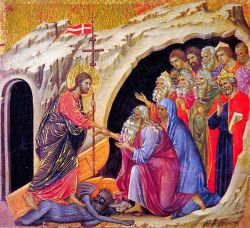God's silence, man's silence
Today Christians should not forget the mystery of the Great and Holy Saturday, a real prelude to Easter. There is no Easter dawn without a Holy Saturday
Speaking of the Holy Saturday may seem paradoxical because for Christians this is a day characterized by silence, a day which may seem a “dead time,” emptied of all meaning. Also the Gospels are silent on this “Great Saturday.” The narration of the Passion ends with the night of Friday, when Saturday dawn is breaking, and it restarts at dawn of the first day of the week, i.e. the third day. Is this then an empty day? In the Western Christian tradition, the Holy Saturday is the only day without a Eucharistic celebration, the only day which has remained without a liturgy, without a particular celebration: the bells are silent, there are no little flames in the bare churches, no chants. Christians’ prayer gets silent as well and it is chiefly a prayer of wait, a wait for what will deeply change each thing, each life story. We certainly know well that Easter is an event which happened eph’hapax, once and forever, in the 30th year of our era, on April, the 9th; we know that Christ, who is resurrected by now, will not die again, we are aware of our not being celebrating a cyclic mystery as the heathens did. Nevertheless we are asked to live this day catching its very meaning. We live it in the faith that the crucified Lord is living among us. But, by choosing the second day of the Easter Triduum as the day of silence, of the wait, of the “not said,” we assume a dimension which always dwells inside us and which is sometimes — in our life, in other men’s life, or in an entire people’s life — the lasting, not momentary, not transitory dimension.
